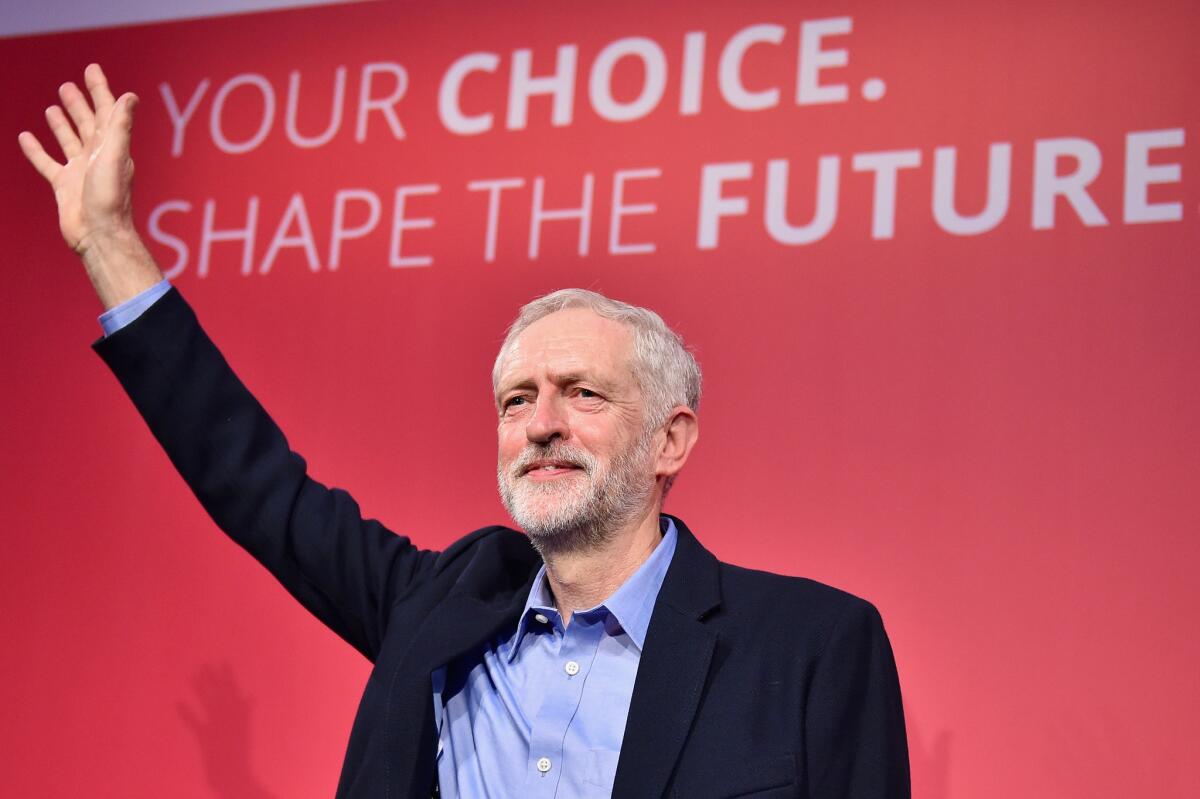Left-winger Jeremy Corbyn swept in as Britain’s Labor Party leader

Jeremy Corbyn was elected Saturday to lead Britain’s Labor Party.
- Share via
reporting from LONDON — Veteran left-wing politician Jeremy Corbyn was elected leader of the Labor Party on Saturday in a landslide vote, casting a spotlight on deep ideological divisions in the once-dominant political organization.
Corbyn, 66, who won nearly 60% of the votes in the four-candidate race, favors Britain’s withdrawal from the North Atlantic Treaty Organization, nuclear disarmament and renationalization of the energy sector.
He is also staunchly anti-austerity and has pledged to apologize for the Labor Party’s role in launching the 2003 U.S.-led Iraqi invasion.
As Corbyn gave his acceptance speech, shadow health minister Jamie Reed resigned from his post, citing ideological differences over nuclear policies.
Reed was followed by several other senior Labor members who said they would nonetheless continue to serve their party from the backbenches of Parliament.
Corbyn’s popularity has caught many by surprise. He has been a member of Parliament since 1983 but always remained on the periphery of his party, and he entered the race as an outsider. He was the oldest candidate in the field and is a vegetarian who loves to cycle and often appears somewhat disheveled, rarely wearing a tie.
His campaign gained ever-increasing momentum in recent weeks, especially among young voters.
Hitting back at claims that the younger generation is apathetic to politics, Corbyn said the problem was that they were “turned off by the way that politics was being conducted.” That must be changed, he said.
Corbyn has promised to take the party back to its roots, away from the more moderate times of the New Labor era of prime ministers Tony Blair and Gordon Brown.
“To those returning to the party who were in it before and felt disillusioned, welcome back, welcome to your party, welcome home,” he said.
Corbyn’s predecessor, Ed Miliband, resigned as party leader after losing the May election to Conservative Prime Minister David Cameron. Miliband pledged his support to Corbyn but expressed hope that he would reach out to all parts of the party.
Before the election, Blair said that Corbyn as party leader could lead to the possible “annihilation” of the Labor Party at the next election. When the vote was announced Saturday, Conservative Party leaders quickly expressed dismay
Defense Secretary Michael Fallon described the result as a “very serious moment” for Britain, and said that it posed a “risk to our national security, to our economic security, to the security of your family.”
Corbyn, who secured 59.5% of the vote, pledged to lead his party back into power. His challengers for the Labor Party leadership were Andy Burnham, who won 19% of the votes, Yvette Cooper, 17%, and Liz Kendall, 4.5%.
Tom Watson, an ally of former Prime Minister Brown, was elected deputy leader.
The leadership election was open only to members, registered supporters or affiliated supporters of the Labor Party. Huge numbers of people paid about $5 to register after the Conservative Party won a majority at the general election.
Corbyn’s first act as leader Saturday was to head to a “solidarity with refugees” rally in central London, which saw tens of thousands march to Parliament Square.
Stepping onto the podium to rapturous applause, he delivered a hard-hitting message to the government:
“Open your hearts and open your minds and open your attitude towards supporting people who are desperate, who need somewhere safe to live, want to contribute to our society and are human beings just like all of us.”
His first challenge as party leader will come Wednesday, when he faces Cameron in the House of Commons for questions.
Boyle is a special correspondent.
More to Read
Sign up for Essential California
The most important California stories and recommendations in your inbox every morning.
You may occasionally receive promotional content from the Los Angeles Times.










